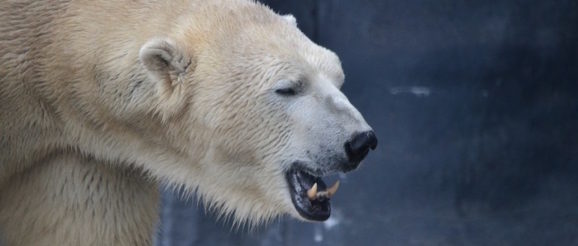Polar bear cannibalism mimics human behaviour under ecological stress | Michael H Hallett

EcoWatch’s Olivia Rosane reports that polar bears are increasingly resorting to cannibalism. A study by Ilya Mordvintsev at Moscow’s Severtsov Institute of Problems of Ecology and Evolution shows increasing levels of cannibalism.
“Cases of cannibalism among polar bears are a long-established fact, but we’re worried that such cases used to be found rarely while now they are recorded quite often,” said Mordvintsev. “In some seasons there is not enough food and large males attack females with cubs.”
Rosane attributes this to loss of habitat due to two factors: rising temperatures in the Artcic that have decreased end-of-summer ice by 40%, and to oil and gas extraction in the polar bears’ habitat.
Gause’s Law
This behavioural change is hardly to be expected. ‘Survival of the fittest’ dictates that under pressure, the strongest will prey on the weakest. Perhaps less expectedly, this isn’t just what animals do; it’s also what mammals do—and we are mammals.
‘Survival of the fittest’ isn’t just what animals do; it’s also what mammals do—and we are mammals.
The competitive exclusion principle, also known as Gause’s Law, states that “two species competing for the same limited resource cannot coexist at constant population values.” Neither can a single species—polar bear or human.
Pitirim A. Sorokin, a Russian sociologist who survived the famine of 1919-1922 that killed about one sixth of the population, noted its impact on the functioning of animals but, as James DeMeo writes in Saharasia, felt that the “experimental data can easily be applied to human beings.”
Famines in East Africa in the 1970s and 80s revealed the stress of environmental loss. As social structures broke down, so too did emotional structures. Husbands abandoned their wives; women abandoned their children.
In Famine in History, D. Carlson reports that, “Interpersonal relationships may be broken down so completely that parents devour their own children; cannibalism has been reported during famine times in almost every part of the world…”
Cannibalism is even recorded in the Bible: “You will be so desperate for food that you will eat your own children.” (Leviticus 26.29)
The effects of habitat loss and environmental stress, animal or human, are disproportionately borne by females and young. As I wrote in Why climate change “increases gender-based violence”, a report by the International Union for the Conservation of Nature (IUCN) has highlighted the rise in violence and sexual violence against women and girls in affected areas.
Cate Owren, one of the IUCN report’s lead authors, stated that, “the evidence shows that, where environmental pressures increase, gender-based violence increases.”
In the quest for survival, environmental stress deeply skews the human psyche away from its feminine, right brain, nurturing aspects towards masculine, left brain, hunter-killer functioning.
While animal rights activists fight for the polar bears’ future, we all need to bear in mind—excuse the pun—that eco-anxiety is affecting every one of us, and that it may even pressure human beings to the point of cannibalism.
Photo: Michael Shehan Obeysekera / Flickr / CC BY 2.0
